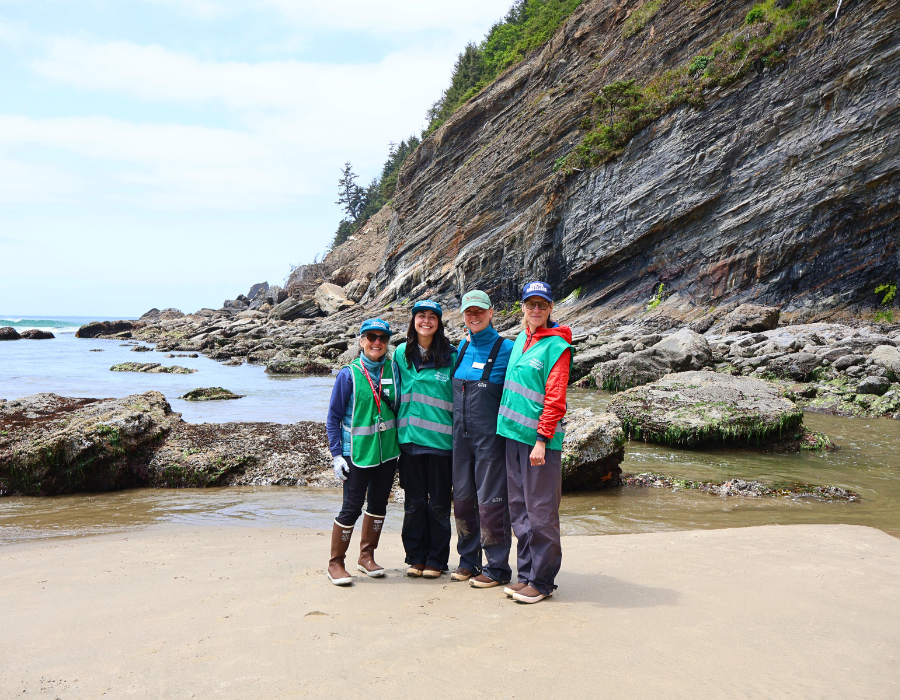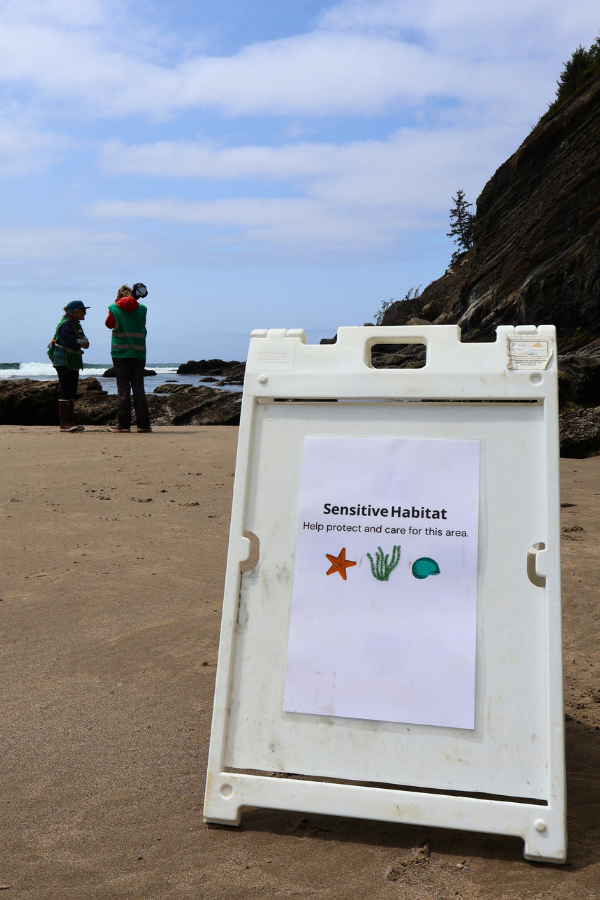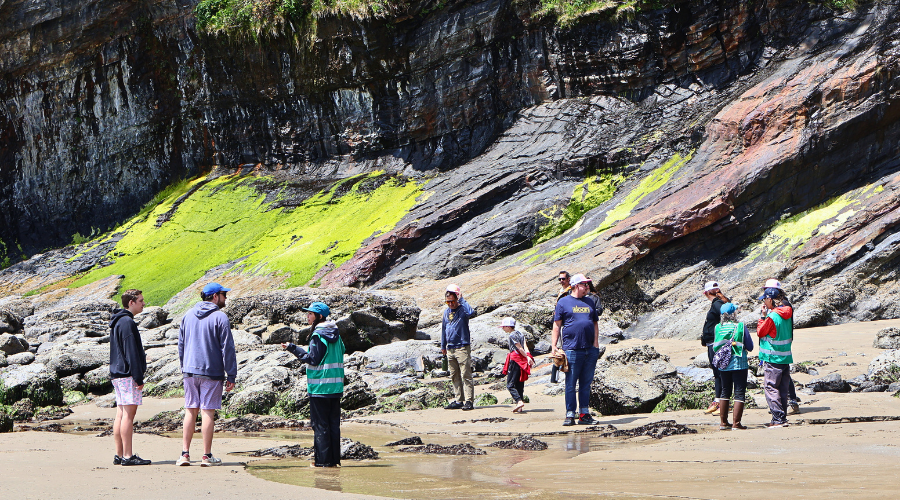When you return to a place on a regular basis, especially to look after and care for it, you begin to develop a relationship to it that’s not dissimilar to a relationship with another person. You experience a growing sensitivity to the challenges it faces, an understanding of its strengths and needs, and an appreciation for its nuanced beauty and functions.
That has been the experience for many of the folks involved in North Coast Land Conservancy’s Tidepool Ambassador Program (TAP) at Short Sand Beach, beside the Cape Falcon Marine Reserve.
For the past couple of years, throughout the summer months, they’ve been down at the tidepools—located on both the north and sound ends of the beach—for hours at a time, playing an active role in their stewardship through education and outreach.

“You feel like you’re bonding to the beach, like the beach is your friend, and you worry about it, and you hope people treat it nice,” says Yvana Iovino, who has been volunteering with TAP at Cape Falcon since it was established in 2021.
For Mylasia Miklas, who served as NCLC’s Land and Sea Steward last summer and has returned as the TAP Guide this summer, it’s a notably different experience to growing up in the suburbs of Texas, where she didn’t have “a lot of access to nature.”
Since moving to the Oregon Coast, she says, “it’s been cool to get to know a place intimately, seeing it change throughout the seasons, and then throughout the years, too, having that different sense of connection and making me feel more human, more like I’m living on Earth.”
Michelle Schwegmann, who also is returning this summer as TAP Coordinator, knows exactly how that can feel.
“People can be so disconnected from the natural world,” she says. “We get to be out here, in the same place, and it does, it becomes a friend, and you know it, just like you know people.”
It’s been cool to get to know a place intimately, seeing it change throughout the seasons, and then throughout the years, too, having that different sense of connection and making me feel more human, more like I’m living on Earth.
Mylasia Miklas, TAP Guide
Maintaining Momentum
The fifth season of TAP started Sunday, June 1, and it will follow a similar format to years past: About a dozen volunteers will take turns being at the tidepools at Short Sand Beach during the lowest tides of the summer. There, they’ll talk with visitors, educating them on marine wildlife, and encouraging proper etiquette when engaging with these—and other—sensitive marine habitats. Generally, volunteer shifts are two to three hours, and a few people handle the shifts together.
Not only are Michelle and Mylasia back in their former leadership roles, but many volunteers from previous years also are returning to support the program. With these pieces in place, NCLC Marine Program Manager Angela Whitlock feels confident and enthusiastic about the upcoming season.
“My intention is always just to keep the momentum going, because I feel like it’s been such a positive thing,” she says. “It’s been received so positively by visitors; it’s been received so positively by the kids that come out. Let’s just keep doing what we’re doing.”
With that being said, the group looks forward to integrating new tools, messaging and resources to connect more effectively with individuals. For example, Mylasia designed an array of interpretive signs last year that are being put to use this summer. They include information about Cape Falcon Marine Reserve; tidepool etiquette; and details about cool creatures that live in the rocky intertidal habitat.
Additionally, there will be a few days this summer when the tides aren’t low enough to have volunteer interpreters down on the beach, so instead, they will be tabling near the picnic area at the beach entrance, just down the trail through Oswald West State Park.
Michelle and Angela view this as a positive supplement to the work TAP is doing on the beach, as it will enable them to connect with people who don’t make it all the way to the tidepools. They’ll get to interact with “beach visitors, not just tidepool visitors, because they’re not the same thing,” Michelle explains. “We’ll be able to reach people with general stewardship messaging,” as well as information about the park and the Cape Falcon Marine Reserve.
Angela agrees, adding that Oregon State Parks has welcomed TAP’s presence, and volunteers are looking forward to the opportunity, as well. They plan to provide binoculars and spotting scopes for bird watching, and Yvana has an idea for a felt tidepool activity to engage young visitors.

“For me,” Angela says, “that’s the way to get the stewardship messaging out, to connect to the kids, because then it’s kids that teach the adults about what’s going on.”
Yvana agrees that in light of what’s currently happening to the Earth, “it’s so nice to have little kids come and teach them about stewardship. …That’s who we’re handing it over to.”
A Never-ending Newness
Beyond the addition of tabling activities near the beach entrance, there is a continual newness at the beach and among the tidepools, because of natural shifts and evolutions. The sand moves, the tides change, the wildlife communities present in different ways, and there are varying levels of both boulder exposure and access to certain areas. One day, the volunteers may spot sunflower sea stars after several years of no sightings. Another day, they’re happening upon dozens of sea lemons (Peltodoris nobilis), a colorful species of sea slugs, in the caves.
“The creatures are generally the same, but you find new ones and different ones,” Yvana says. And, as Angela puts it, “It’s a little present every time.”
Michelle also cherishes the opportunity “to watch how we get better at serving this marine reserve, how we get better at stewarding this place, and how to best communicate with visitors about areas we want to be super cautious about protecting.”
Mylasia shares that sense of responsibility, and the excitement that comes with it. “I love being out here, I love being out in the tidepools, I love being able to educate people and share what I love so much with so many other people that come down to the coast to visit.”
NCLC’s Tidepool Ambassador Program at Cape Falcon Marine Reserve is funded in part by the Oregon Coast Visitors Association.

Comments